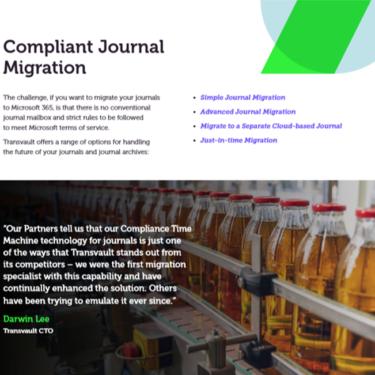Transvault Journal Migration DataSheet
Transvault offers a range of options for handling the future of your journals and journal archives.
Email journals have a key role to play when it comes to compliance. Any organization that has utlilized a third-party email journal archive will want to ensure their journal data is migrated securely and eDiscovery capabilities enhanced.
Transvault is here to help you migrate your email journal archives to your new platform. We maintain full chain-of-custody and ensure that your migrated journals are accessible along with your new records.
Leverage the power of the cloud and efficient eDiscovery with our market-leading journal migration service, specializing in moving to Microsoft Office 365.
Our Partners tell us that our Compliance Time Machine technology for journals is just one of the ways that Transvault stands out from its competitors – we were the first migration specialist with this capability and have continually enhanced the solution. Others have been trying to emulate it ever since.
More and more organizations in regulated industries are choosing to migrate their journal archives to Microsoft 365. The aim is to have historic journal records sitting alongside new email records, preserved and accessible for eDiscovery and compliance.
Yet there is a problem – a conventional journal mailbox doesn’t exist in Microsoft 365. You can’t simply migrate a journal mailbox to Office 365. Without a dedicated journaling mailbox, you need a fresh approach that avoids further costs but still maximises the impact of the cloud.
Transvault provides Microsoft 365 journaling solutions that adhere to the strict rules necessary to meet Microsoft’s terms of service. Protect the future of your journals and journal archives with:

Key benefits
High-performance, big data handling
Transvault allows large journal archives to be split into a number of separately handled virtual mailboxes. This enables multiple processing threads to be applied to the migration of a single mailbox, significantly speeding up the migration task.
Ensure Future Compliance
Your legacy data is migrated into Microsoft 365 so that it conforms fully to Microsoft-compliant data retention policies, data structure and eDiscovery practices. All of this means that Microsoft’s licensing policy is respected.
Preserve Leaver’s Data
A full analysis of Journal messages enables you to make informed decisions about what to migrate before processing begins. You can also take advantage of Microsoft’s inactive mailboxes service to ensure future retention and eDiscovery of leaver’s email held in journals.
Protects All Metadata
All message recipient information will be fully available for eDiscovery. This includes any BCC’d recipients, distribution list members, messages sent ‘on behalf of’, etc. We help eliminate the risk of any legacy data being accidentally excluded from eDiscovery workflows.
Migrating Journals to Microsoft 365?
When it comes to email journal migrations, Transvault offers a solution matched to your organization’s needs. Whatever the scale of your project, we will ensure that your historic data is moved securely.
Transvault’s simple journal migration service can be used to migrate existing journals into one or more ‘shared mailboxes’ in Microsoft 365.
Transvault delivers full chain-of-custody and the detailed auditing demanded of a compliance-led data migration. We also reconstruct emails into a ‘regular user format’ and ensure that vital BCC’d and Distribution List recipients are preserved and visible to the Microsoft 365 eDiscovery process as email metadata.
Developed in conjunction with Microsoft, the Compliance Time Machine (CTM) feature of Transvault Migrator, offers a zero-risk solution for migrating a journal archive to Microsoft 365. Our unique service ensures email compliance records are:
Transvault has partnered with a market-leading Cloud-native storage provider to offer their journal archive solution. This means that the journal can be directly migrated and your compliance data retained independently of your Microsoft 365 mailboxes.
If your journal is extremely large, you might elect to adopt an age-in-place strategy. This might require you to maintain your journal in on-premises storage.
In this case, Transvault will help index its contents for rapid collection into your eDiscovery process at a future date. This reduces the need to manage and fund archive eDiscovery capability (e.g. Discovery Accelerator).

Transvault offers a range of options for handling the future of your journals and journal archives.